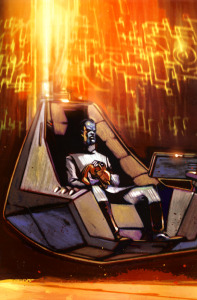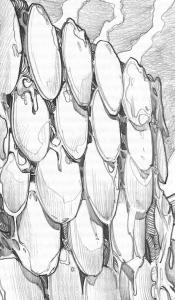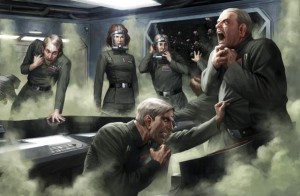 We all have fond memories of the time when Bantam held the Star Wars publishing license- a time that brought us everything from the Thrawn trilogy to The Crystal Star. It’s a universe rife with opportunities and new ideas, full of unexplored territory and possibilities. The sense of wonder and exploration is one vital to the Star Wars universe, and the first authors to set pen into a much wider universe established many precedents. Some of this era has been retconned, some is known well as the strangest things of the EU, and some is lauded as the best of the best. Let’s take a trip down memory lane and see why Bantam’s contributions to the EU are so vital, warlord of the week notwithstanding.
We all have fond memories of the time when Bantam held the Star Wars publishing license- a time that brought us everything from the Thrawn trilogy to The Crystal Star. It’s a universe rife with opportunities and new ideas, full of unexplored territory and possibilities. The sense of wonder and exploration is one vital to the Star Wars universe, and the first authors to set pen into a much wider universe established many precedents. Some of this era has been retconned, some is known well as the strangest things of the EU, and some is lauded as the best of the best. Let’s take a trip down memory lane and see why Bantam’s contributions to the EU are so vital, warlord of the week notwithstanding.
First of all, let’s make fun of Bantam. I think we have to start with Waru, the entirety of The Crystal Star, and the very fact that some extremely silly things happened in this era of Star Wars publishing. There are so many odd plot holes, confusing references to whatever may have happened in the Galactic Civil War, and myriad kidnappings of the Solo kids. There’s the ghost in the computer who possesses someone else’s body and falls in love with Luke Skywalker. Han Solo wins a planet in a card game, and no one seems to think this is weird. However, this era does establish some good precedents. Seeing the Solo kids in danger all the time really establishes just how high-profile the New Republic’s First Family really are, even though the kids really just are trying to be normal kids. We don’t know what we’re going to find in backwater planets that haven’t really had much contact with the New Republic, and it could be extradimensional beings, unusual aliens, or stray Imperials. Having such a big galaxy and so few precedents set for just how it would all work gave the plotlines enormous creative freedom.
In retrospect, it was because there were significant gaps in the universe, and we had no idea what had happened before A New Hope– and best of all, that era was off-limits. For all we knew, the Yevetha could have caused the Clone Wars, and that would have been completely plausible. Having so much unexplored territory in the timeline can be very liberating for the creative team,  and when things don’t work out as planned, it’s also easy to write off as muddled in-universe history due to a regime that was rather strict on what information was permitted. The vast creative freedom afforded by a wide-open timeline is something that’s going to get re-used in the future, as we suddenly no longer know what happened between Return of the Jedi and Episode VII. We have to embrace the lack of knowledge, and accept that some of the ideas might not work out or are ultimately contradicted. However, this is a great opportunity! The minor warlords, crime lords, extradimensional beings, odd alien species, and other sights of this era fit in well in context, and even if they seem strange afterwards, it worked at the time. If the Story Group is really planning to take inspiration from the whole Legends-verse, the Bantam era has quite a bit to offer.
and when things don’t work out as planned, it’s also easy to write off as muddled in-universe history due to a regime that was rather strict on what information was permitted. The vast creative freedom afforded by a wide-open timeline is something that’s going to get re-used in the future, as we suddenly no longer know what happened between Return of the Jedi and Episode VII. We have to embrace the lack of knowledge, and accept that some of the ideas might not work out or are ultimately contradicted. However, this is a great opportunity! The minor warlords, crime lords, extradimensional beings, odd alien species, and other sights of this era fit in well in context, and even if they seem strange afterwards, it worked at the time. If the Story Group is really planning to take inspiration from the whole Legends-verse, the Bantam era has quite a bit to offer.
The very tone of the Bantam era had the feel of a much more expansive universe than some of the later books. Though the former Rebel Alliance had to be quite familiar with the dark corners of the galaxy, it gets emphasized that it’s a huge galaxy and there are many new things to be discovered. We also finally start to understand just how much of a challenge it was to overthrow the Empire, and how difficult it will be to get a functioning government running again. Warlords of the week show that there were many very powerful parties in the Empire who survived the Battle of Endor, and even without the Empire being in full power, they are still a serious threat. The New Republic isn’t always sure how to become a government in their own right, as they have spent so many years in guerilla warfare that they haven’t really had to consider what they’d do when- or if- they won. The confusion of restoring order in the galaxy isn’t downplayed, we know how clueless Luke is about reestablishing the Jedi, and even the less competent Imperials are still strong enough to be dangerous. Not giving the New Republic an easy victory is paramount to maintaining the tone set in Return of the Jedi: the Rebel Alliance won against all odds, accomplished something that should have been impossible. The new New Republic’s stumbles make it clear that the Battle of Endor is the exception, not the rule, and even several years later, the galaxy was still a very dangerous place for an optimistic new democracy.
 Warlord of the week has been criticized as a storytelling strategy, but it gives shape to a chaotic galaxy. There is little certain after the fall of the Empire, and one of the few things we can count on is how the death of the Emperor did not actually eliminate the Empire. We get a well-populated cast of Imperials of all sorts- Isard, Thrawn, Daala, the cloned Emperor, and many more- and some are more threatening villains than others. However, many of the more inept villains make a good point: that this new post-Empire galaxy is trying to figure out just what will happen next. Even someone as inconsistent as Daala did serious damage to the New Republic, simply because it was on such shaky ground. Future Star Wars works will also need to remember that the galaxy didn’t just flip a switch from Empire to New Republic, and the Empire didn’t die quietly or easily. Superweapons of course can abound; the Empire researched a wide variety of things and came up with some weapons that are, in retrospect, unworkable. However, there are many elements jockeying for control of the galaxy, and we get a large slice of them. Not downplaying the instability and making an ensemble cast of villains does make for entertaining storytelling.
Warlord of the week has been criticized as a storytelling strategy, but it gives shape to a chaotic galaxy. There is little certain after the fall of the Empire, and one of the few things we can count on is how the death of the Emperor did not actually eliminate the Empire. We get a well-populated cast of Imperials of all sorts- Isard, Thrawn, Daala, the cloned Emperor, and many more- and some are more threatening villains than others. However, many of the more inept villains make a good point: that this new post-Empire galaxy is trying to figure out just what will happen next. Even someone as inconsistent as Daala did serious damage to the New Republic, simply because it was on such shaky ground. Future Star Wars works will also need to remember that the galaxy didn’t just flip a switch from Empire to New Republic, and the Empire didn’t die quietly or easily. Superweapons of course can abound; the Empire researched a wide variety of things and came up with some weapons that are, in retrospect, unworkable. However, there are many elements jockeying for control of the galaxy, and we get a large slice of them. Not downplaying the instability and making an ensemble cast of villains does make for entertaining storytelling.
There is a distinctive feel to Star Wars as a universe, and the Bantam era did a great job of establishing what kind of universe we were reading about. The sense of a brave new galaxy for our heroes, filled with new wonders and dangers, helped Star Wars fit better into the genre of space opera. The larger-than-life heroes and villains may seem a little unbelievable afterwards, but they work well for the setting. For Star Wars to maintain its feel of being a legend set in space, new publishing can learn a lot from the way the Bantam books were written. Just because it can be silly or doesn’t always make sense later on, doesn’t mean it isn’t useful and worth it.
One of the things I love the most about A New Dawn was how much it reminded me of the old Bantam books. For many of us, we fell into the EU due to those books, and we have fond memories, even if the books didn’t necessarily hold up in the second read-through. The legacy of this entire era of publishing should center more around the tone and themes that it brought, since those work well with what the future holds. We’re going back into a completely unknown galaxy, and the new Story Group has a lot of space to work with. What if we saw some of the warlords crop up again? Even just as a throwaway line in Episode VII about the number of Imperials who kept showing up and being a serious threat to the New Republic or whatever it’s going to be called. We have a Story Group defining more of the creative vision, and we actually do know about the era leading up to the Galactic Civil War. There are still significant gaps, but at least the overall framework of the galaxy is more in place. Bantam worked very well with a galaxy that was only partially visible, and managed to shape some order out of the chaos and off-limits that had been the GFFA.
Just from A New Dawn, we see little references to concepts and ideas that started within the Bantam EU. Maintaining the tone of Star Wars despite having a drastic overhaul is essential for the ongoing success of Star Wars literature, and Bantam did so much for the foundation that we can’t just dismiss it all as the TV Trope “Early Installment Weirdness.” Seeing something new that reminds me of the way I started in this fandom gives me a lot of hope for its future, something we very much need. And we’ll almost definitely see little things that we can point at and say “I remember which book that was introduced in!”

Nice work.